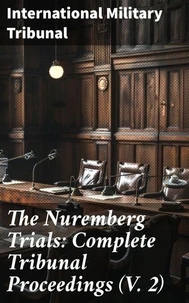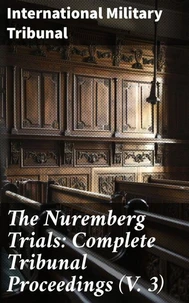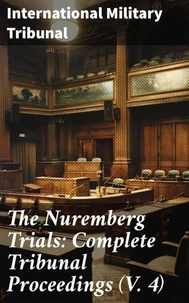The Nuremberg Trials (Vol.10)
Par :Formats :
Disponible dans votre compte client Decitre ou Furet du Nord dès validation de votre commande. Le format ePub est :
- Compatible avec une lecture sur My Vivlio (smartphone, tablette, ordinateur)
- Compatible avec une lecture sur liseuses Vivlio
- Pour les liseuses autres que Vivlio, vous devez utiliser le logiciel Adobe Digital Edition. Non compatible avec la lecture sur les liseuses Kindle, Remarkable et Sony
 , qui est-ce ?
, qui est-ce ?Notre partenaire de plateforme de lecture numérique où vous retrouverez l'ensemble de vos ebooks gratuitement
Pour en savoir plus sur nos ebooks, consultez notre aide en ligne ici
- Nombre de pages508
- FormatePub
- ISBN406-4-06-638095-3
- EAN4064066380953
- Date de parution07/05/2021
- Protection num.Digital Watermarking
- Taille638 Ko
- Infos supplémentairesepub
- ÉditeurMUSAICUM BOOKS
Résumé
The Nuremberg Trials (Vol.10) by the International Military Tribunal is a seminal work that delves into the legal aftermath of World War II. This comprehensive volume meticulously details the proceedings, verdicts, and impact of the historic Nuremberg Trials. The book provides a thorough analysis of the legal challenges faced by the Tribunal, highlighting key moments of the trial and the resulting groundbreaking precedents that shaped international law.
The narrative is presented in a clear and concise manner, making it accessible to both legal scholars and general readers interested in the intersection of justice and history. The book's literary style is marked by its authoritative tone and attention to detail, offering a compelling account of one of the most significant trials in modern history. The Nuremberg Trials (Vol.10) stands as a testament to the enduring importance of holding individuals accountable for crimes against humanity.
The author, the International Military Tribunal, comprised of judges from the Allied powers, brings a wealth of legal expertise and firsthand knowledge to this seminal work. Their collective experience in prosecuting war crimes and establishing a framework for international justice lends credibility and depth to the book. Through their meticulous research and rigorous analysis, the Tribunal sheds light on the complexities of the legal process and the moral imperatives that guided their decisions.
I highly recommend The Nuremberg Trials (Vol.10) to readers interested in the intersection of law, history, and morality. This invaluable resource offers a compelling account of a landmark moment in international jurisprudence, serving as a poignant reminder of the importance of accountability in the face of atrocities.
The narrative is presented in a clear and concise manner, making it accessible to both legal scholars and general readers interested in the intersection of justice and history. The book's literary style is marked by its authoritative tone and attention to detail, offering a compelling account of one of the most significant trials in modern history. The Nuremberg Trials (Vol.10) stands as a testament to the enduring importance of holding individuals accountable for crimes against humanity.
The author, the International Military Tribunal, comprised of judges from the Allied powers, brings a wealth of legal expertise and firsthand knowledge to this seminal work. Their collective experience in prosecuting war crimes and establishing a framework for international justice lends credibility and depth to the book. Through their meticulous research and rigorous analysis, the Tribunal sheds light on the complexities of the legal process and the moral imperatives that guided their decisions.
I highly recommend The Nuremberg Trials (Vol.10) to readers interested in the intersection of law, history, and morality. This invaluable resource offers a compelling account of a landmark moment in international jurisprudence, serving as a poignant reminder of the importance of accountability in the face of atrocities.
The Nuremberg Trials (Vol.10) by the International Military Tribunal is a seminal work that delves into the legal aftermath of World War II. This comprehensive volume meticulously details the proceedings, verdicts, and impact of the historic Nuremberg Trials. The book provides a thorough analysis of the legal challenges faced by the Tribunal, highlighting key moments of the trial and the resulting groundbreaking precedents that shaped international law.
The narrative is presented in a clear and concise manner, making it accessible to both legal scholars and general readers interested in the intersection of justice and history. The book's literary style is marked by its authoritative tone and attention to detail, offering a compelling account of one of the most significant trials in modern history. The Nuremberg Trials (Vol.10) stands as a testament to the enduring importance of holding individuals accountable for crimes against humanity.
The author, the International Military Tribunal, comprised of judges from the Allied powers, brings a wealth of legal expertise and firsthand knowledge to this seminal work. Their collective experience in prosecuting war crimes and establishing a framework for international justice lends credibility and depth to the book. Through their meticulous research and rigorous analysis, the Tribunal sheds light on the complexities of the legal process and the moral imperatives that guided their decisions.
I highly recommend The Nuremberg Trials (Vol.10) to readers interested in the intersection of law, history, and morality. This invaluable resource offers a compelling account of a landmark moment in international jurisprudence, serving as a poignant reminder of the importance of accountability in the face of atrocities.
The narrative is presented in a clear and concise manner, making it accessible to both legal scholars and general readers interested in the intersection of justice and history. The book's literary style is marked by its authoritative tone and attention to detail, offering a compelling account of one of the most significant trials in modern history. The Nuremberg Trials (Vol.10) stands as a testament to the enduring importance of holding individuals accountable for crimes against humanity.
The author, the International Military Tribunal, comprised of judges from the Allied powers, brings a wealth of legal expertise and firsthand knowledge to this seminal work. Their collective experience in prosecuting war crimes and establishing a framework for international justice lends credibility and depth to the book. Through their meticulous research and rigorous analysis, the Tribunal sheds light on the complexities of the legal process and the moral imperatives that guided their decisions.
I highly recommend The Nuremberg Trials (Vol.10) to readers interested in the intersection of law, history, and morality. This invaluable resource offers a compelling account of a landmark moment in international jurisprudence, serving as a poignant reminder of the importance of accountability in the face of atrocities.





